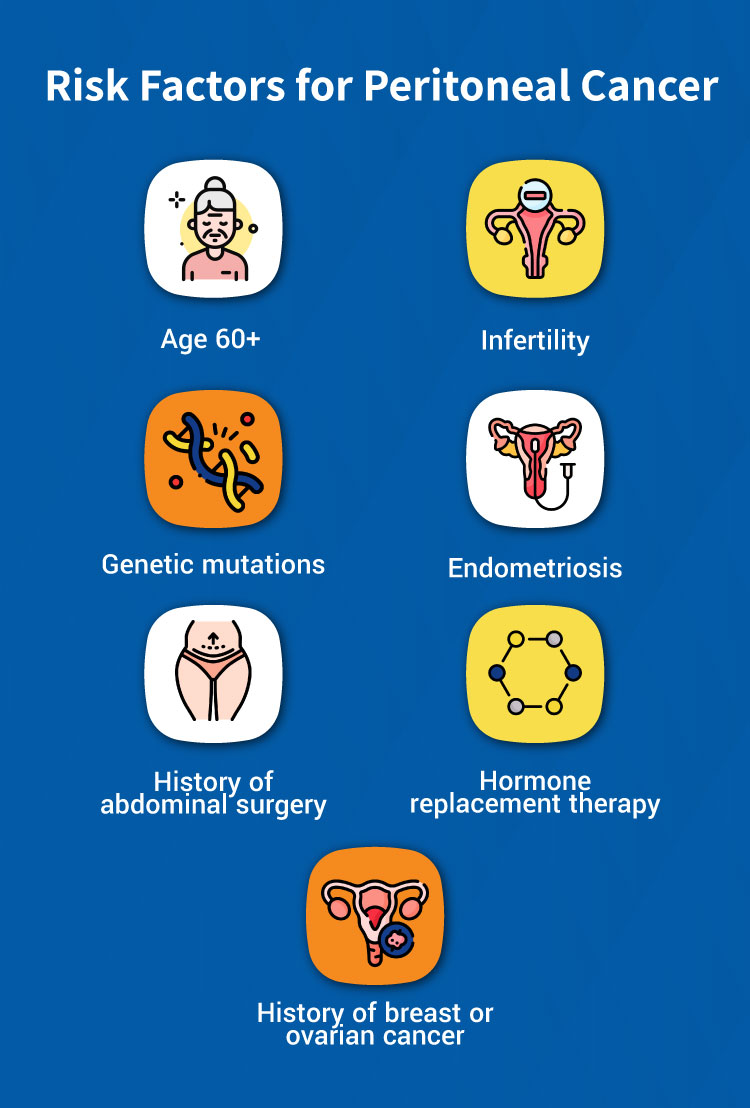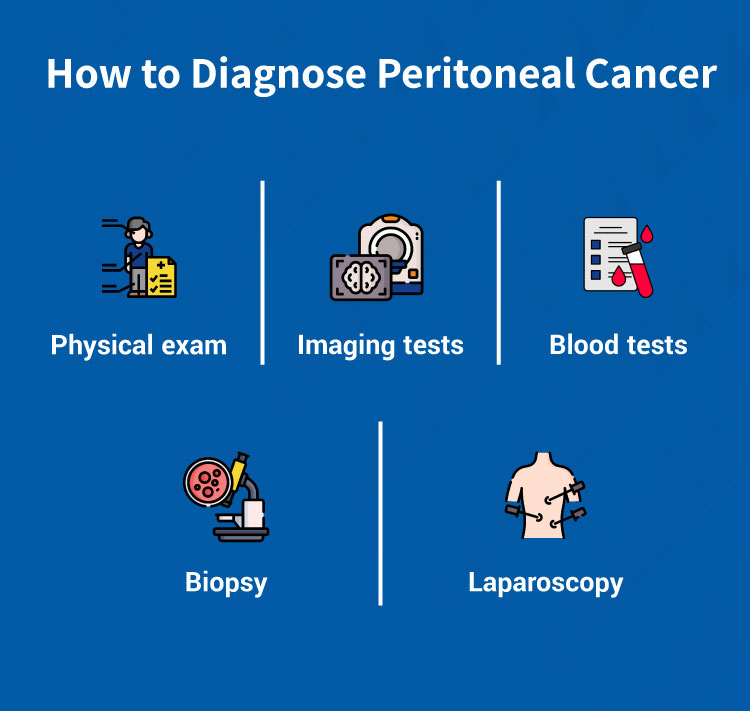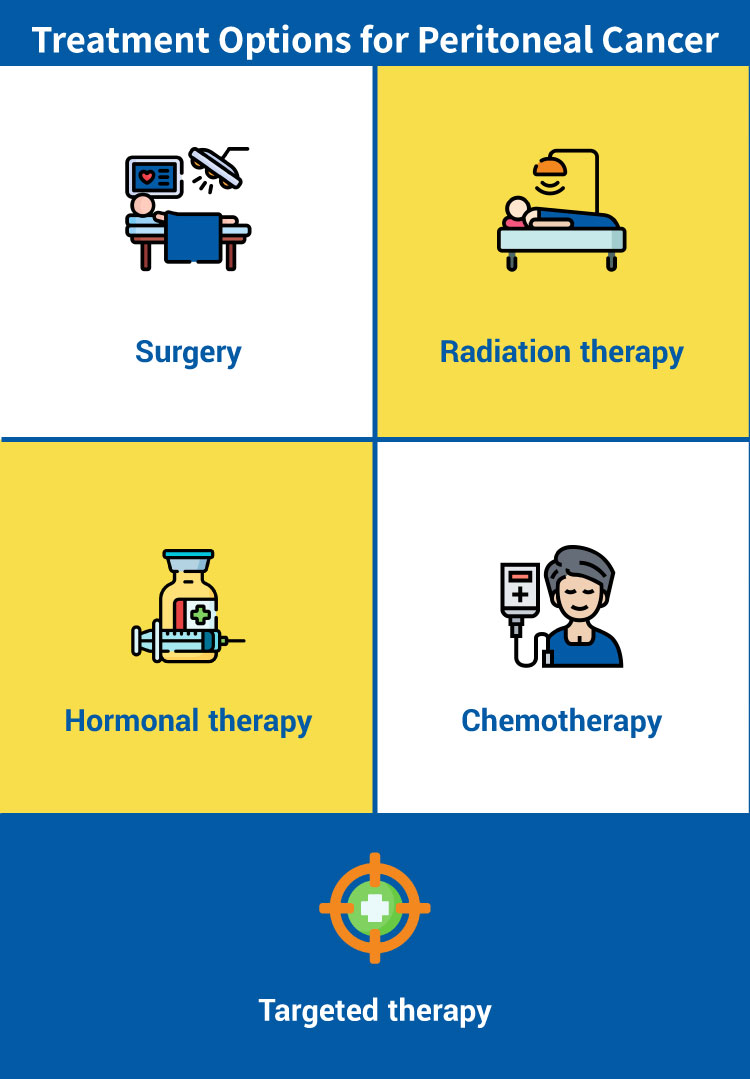This is a rare form of cancer that affects the peritoneum- a thin layer of tissue lining the abdomen and covering the organs in the abdominal cavity. Peritoneal cancer develops when abnormal cells in the peritoneum divide and grow at an uncontrollable rate, eventually forming tumors. This cancer can be difficult to diagnose and treat, but early detection can improve the prognosis rate.
Peritoneal cancer is primarily of two types- primary and secondary. While primary peritoneal cancer starts in the peritoneum, secondary peritoneal cancer begins in some other parts of the body, such as the ovaries, and eventually spreads to the peritoneum. However, both types have similar symptoms and treatment options.
In this blog post, we will share the causes, symptoms, diagnosis, and treatment options for peritoneal cancer to understand this rare and complex disease in detail. Read on to learn more.
Risk Factors for Peritoneal Cancer

- Age
Peritoneum cancer is more common in older adults, particularly those aged 60 or above.
- Gender
Women, who have a history of breast or ovarian cancer are more likely to be diagnosed with this disease than men.
- Genetic mutations
Certain inherited genetic mutations, such as mutations in the BRCA1 and BRCA2 genes may put individuals at an increased risk.
- Endometriosis
Women with endometriosis- a condition in which the tissue lining the uterus grows outside the uterus, may have an increased risk of developing peritoneal cancer.
- History of abdominal surgery
People who have undergone abdominal surgery may be at greater risk.
- Hormone replacement therapy
Women with a history of hormone therapy after menopause may develop this disease.
- Reproductive history
The risk may be higher for those who are infertile or who do not have biological children.
Individuals who have one or more of these risk factors may or may not develop this disease. Similarly, some people may develop peritoneal cancer without having any known risk factors.
Signs and Symptoms
In its early stages, peritoneal cancer is often difficult to detect because its symptoms are not exclusive and similar to those of many other diseases. However, the following are some early signs that may indicate peritoneal cancer:
- Abdominal discomfort or pain
- Bloating
- Abdominal swelling
- Loss of appetite
- Constipation or diarrhea
- Abnormal vaginal bleeding (in women)
As the disease progresses, it may cause more severe symptoms which are as follows:
- Swelling or fluid buildup in the abdomen (ascites)
- Nausea and vomiting
- Unexplained weight loss
- Fatigue
- Urinary urgency or frequency
- Swelling in the legs
- Difficulty breathing (in case the cancer has spread to the lungs)
Seeking medical attention is crucial if any of these symptoms worsen or persist for more than one week. If you suspect peritoneal cancer, contact ACTC, one of the best cancer treatment centers in Florida that offer personalized cancer care under the supervision of highly trained cancer care specialists.
Diagnosis
If primary care physicians suspect peritoneal cancer, they may recommend one or more diagnostic tests, including the following:

- Physical exam
Healthcare providers generally perform a thorough physical exam, namely a pelvic exam to detect any lumps or swelling in the abdomen.
- Imaging tests
CT scans or MRIs are commonly used imaging tests that physicians recommend to check the abdominal organs and confirm the presence of any abnormalities.
- Blood tests
Physicians also recommend blood tests to check for certain markers such as CA-125 that indicate the presence of peritoneal cancer.
- Biopsy
If the healthcare providers find any abnormalities that may indicate the possibility of cancer, oncologists perform a biopsy to confirm the diagnosis.
- Laparoscopy
In some cases, healthcare providers may perform a laparoscopy to view the peritoneum and collect tissue samples.
Treatment Options for Peritoneal Cancer
It depends on the stage and type of peritoneal cancer, as well as the patient’s overall health and treatment goals. The following are the most common treatment options for peritoneal cancer:

- Surgery
The goal of surgery for the treatment of peritoneal cancer is to remove the cancerous cells or tissues as much as possible. In some cases, oncologists may also perform peritonectomy, a process in which they remove the entire peritoneum.
Oncologists usually recommend surgery as the first line of treatment for peritoneal cancer if the disease has not spread beyond the peritoneum. However, if cancer has spread to other organs, surgery may work as a palliative measure to relieve symptoms.
- Chemotherapy
This traditional cancer treatment procedure uses drugs to kill cancerous cells. Oncologists usually recommend it for advanced peritoneal cancer that has spread beyond the peritoneum. However, it may also be used in combination with surgery to increase the chances of complete recovery.
Chemotherapy may be administered intravenously or directly into the abdominal cavity (intraperitoneal chemotherapy). In some cases, oncologists may also use hyperthermic intraperitoneal chemotherapy (HIPEC) which involves administering heated chemotherapy directly into the abdominal cavity during surgery for more effective results.
- Radiation therapy
Oncologists may recommend radiotherapy in combination with surgery or chemotherapy, or as a standalone treatment for peritoneal cancer. It is typically used in cases where cancer has spread beyond the peritoneum, or cancer cannot be completely removed with surgery.
- Targeted therapy
This is comparatively a new cancer treatment approach that uses drugs to specifically target cancer cells. Primary care physicians may prescribe targeted therapy in combination with chemotherapy or as a standalone treatment. It is usually recommended for peritoneal cancer that has certain genetic mutations.
- Hormonal therapy
In more advanced cases of peritoneal cancer, providers sometimes recommend hormonal therapy in combination with chemotherapy. It blocks the natural hormones in the body from reaching cancer-affected cells, therefore, preventing their growth.
In Stage IV or advanced peritoneal cancer, palliative care is provided to relieve the symptoms and improve the quality of life. Palliative care involves pain management, symptom control, and emotional support. Visit a cancer treatment center and work closely with a team of oncologists and primary care physicians to determine the best course of treatment based on individual requirements.
Prognosis
Peritoneal cancer is a rare but aggressive form of cancer that has a comparatively poor prognosis rate since the early symptoms are usually not visible. The five-year survival rate for peritoneal cancer is around 15%, but it can vary depending on several factors including the stage, the type, and the overall health of individuals. For instance, the five-year survival rate for localized peritoneal cancer is way better than for advanced cancer.
Conclusion
Coping with a diagnosis of peritoneal cancer can be challenging, but a few strategies can help. Individuals can seek support from loved ones, educate themselves about the disease, meditate, and most importantly stay positive to fight the challenges of peritoneal cancer.
If your loved one has been diagnosed with peritoneal cancer, consult a team of expert healthcare professionals to develop a personalized treatment plan. Individuals should stay involved in their care to take informed decisions and manage the disease more effectively.

